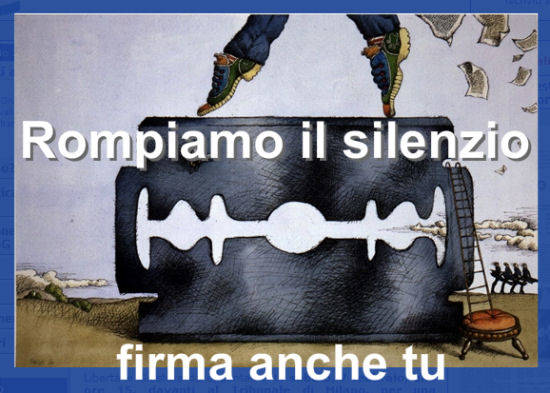Breaking the Silence
Paul Ginsborg, the eminent historian of contemporary Italy, outlined some of the daunting challenges facing the opposition to Premier Silvio Berlusconi when he spoke at the “Denuncia: Speaking Out in Modern Italy” conference in New York last month.(See: Regime and Resistance) Though generally pessimistic, Ginsborg did cite one stratum of Italian society as a potentially effective opposition force, “i ceti medi reflessivi,” educated and civic-minded middle-class professionals whose standard of living has declined in the current economic crisis and who are appalled by the Berlusconi regime.
Libertà and Giustizia (Freedom and Justice) is a civil society association founded as a vehicle for members of that social stratum to express their outrage over the state of Italian politics and their commitment to democracy. The group recently issued a manifesto, “Rompiamo il Silenzio” (Let’s Break the Silence), which was distributed at the Denuncia event. The manifesto has gotten more than 200,000 signatures since it was posted online two months ago.
“Rompiamo il Silenzio” opens with a quotation from the left-wing social theorist Norberto Bobbio: “The path of democracy is not an easy one. One needs to be continually vigilant, not resigned to the worst nor given over to a tranquil trust in the inevitably progressive fate of humanity…We are, we must be, democrats always on the alarm.”
Alarm, according to the manifesto, “has never been as justified as now.” In today’s Italy there are “unequivocal signs of social decay: the loss of a civic sense, public and private corruption, contempt for legality and equality, impunity for the strong and constraint for the weak, freedom as privileges and not as rights.”
“When social ties are put at risk,” the statement continues, “one is not astonished by secessionist ideas, racist and xenophobic outbursts, vulgarity and arrogance and violence in relations between individuals and groups. Most worrisome is the passive acceptance of all this that permeates the culture.”
“Not seeing is not wanting to see,” the statement notes. “We don’t know how it all will turn out, but we are warning that democracy is in the balance.”
Libertà e Giustizia “is not a political party, it doesn’t seek to become one, and it does not aspire to substitute for political parties. But it wants to give a positive direction to the growing dissatisfaction with politics, transforming it into participation and proposals.”
“Rompiamo il Silenzio” speaks a language of ethics and culture; it states that Libertà e Giustizia seeks “to culturally enrich national politics with its analyses and proposals.” The association seeks to become “the missing link between positive social ferment and the official space of politics.”
The ethical language and appeals for political and civic regeneration don’t preclude Libertà e Giustizia from getting specific. The various documents, articles, press releases, blogs and polls at the association’s website take on such hot-button issues as Berlusconi’s and the Right’s efforts to undermine the Constitution and center power in the executive branch of government, economic crisis in Italy, the intrusion of religion into politics and the undermining of the secular state, political and economic corruption, organized crime, racism and xenophobia.
Libertà e Giustizia does more, however, than issue manifestos and maintain a website. It also holds public meetings, conferences, seminars and demonstrations, all with the aim of promoting a new political culture and ethics. In March, it held an anti-Fascism rally in Milan.
Founded and based in Milan, its leadership consists almost entirely of northern Italians, mainly academicians and journalists, and some attorneys and businesspeople. One of its founders is the internationally renowned author and philosopher Umberto Eco; its current president is the veteran journalist Sandra Bonsanti. Though its base and leadership is in the north, the association has chapters throughout Italy, including the southern regions of Campania, Puglia, Calabria, and Sicily.
For anyone acquainted with modern Italian history, the association’s name is a dead giveaway of its political orientation. “Libertà e Giustizia” reverses the terms in the name of the anti-fascist organization founded in Paris in 1929 by the refugees Carlo Rosselli, Emilio Lussu, Alberto Tarchiani, and Ernesto Rossi. Giustizia e Libertà organized resistance to Fascism, forming clandestine groups in Italy and engaging in a propaganda war against Mussolini’s dictatorship. Giustizia e Libertà partisans also fought in another great anti-Fascist struggle, the Spanish Civil War.
Like its predecessor and inspiration, today’s Libertà e Giustizia is non-Marxist and social democratic in its politics, and committed to a market economy. Progressive, but not radical. It upholds the values expressed in the Italian Constitution, including secularism, decries abuses of power, and champions democratic political values and participation. So maybe, in today’s Italy, these men and women of “i ceti medi reflessivi” are doing something that indeed is radical.
Visit Libertà e giustizia online. The association is still accepting signatures for “Rompiamo il Silenzio.”


































i-Italy
Facebook
Google+
This work may not be reproduced, in whole or in part, without prior written permission.
Questo lavoro non può essere riprodotto, in tutto o in parte, senza permesso scritto.